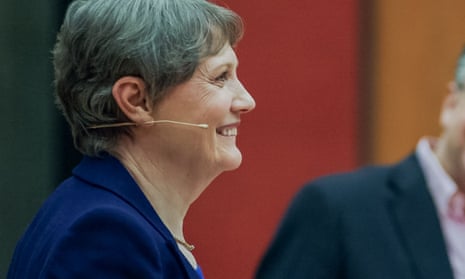In the United Nations’ 72-year history, eight of its nine secretaries general have been decided behind closed doors by a few powerful countries. But not the ninth. Last year’s appointment process resembled American Idol: a public-facing contest with a strong social media component and a side of drama and double-crossing.
When the process to replace Ban Ki-moon got under way in April 2016, it was said to be unprecedented in its transparency. Helen Clark, one of the eight unsuccessful challengers, is quick to put that into context. “The ‘transparency’ – I’ll put that in quotation marks – I don’t think that had any impact on the outcome,” she says. “What it did was expose how opaque the real process was.”
As head of the UN development program, Clark had been considered a strong contender when she announced her candidacy, particularly given the groundswell of support for a female leader. By 30 September – the week before the former Portuguese prime minister António Guterres was confirmed in the top job – her chances had reportedly dwindled to nil.
“I won the public vote, I won the social media scene, I won the staff votes – all of that, but it didn’t matter at all,” says Clark pragmatically, without bitterness. “Clearly, the security council wasn’t looking for someone like me, from a small, independent-minded country, having been an independent-minded leader, who looks at the evidence and makes decisions accordingly.
“That’s fine. That’s the outcome.”
Clark’s experience of the process is the subject of a documentary, My Year with Helen, that screened last weekend as part of the Sydney film festival. What thoughts or feelings did she have, watching her failed bid unfold again, from within the audience?
“You know, I’ve always had a capacity to move on from things very fast,” she says. “That was a pretty intense six-month period and at the end of it I shut the door, went home to see my family and got on with life.”
As prime minister of New Zealand from 1999 to 2008, Clark had a reputation as a pragmatist, led by her values on decisions such as to stay out of the Iraq war and to accept refugees from Australia. In an interview looking back on her leadership, New Zealand’s public service broadcaster called her “The Commander”.
“Such was her dominance, if Clark said something out loud, then it would happen.”
New Zealand certainly rallied behind her bid for the top UN post, in part because of her active and personable presence on social media.
My #Sydney day on #Snapchat for world 🌎 premiere of #MyYearWithHelen @sydfilmfest. #GaylenePreston @NZFilmCommissh @nzff @monsoonpictures pic.twitter.com/jJdoA2oBmT
— Helen Clark (@HelenClarkNZ) June 10, 2017
She has large followings on Twitter, Facebook, Instagram and Snapchat, all of which she confirms she updates herself. “I even have my Bitmoji now – my avatar.” Pulling out her iPhone, she shows me a cartoon version of herself holding a flask of coffee and bidding us “a great day”.
Her last post reached 162,000 people. “It’s just me. I don’t have a machine behind it ... You get the odd idiot but overwhelmingly people are constructive and pleasant.”

Last week, after John Key was granted a knighthood in the Queen’s birthday honours, Clark delighted New Zealand Twitter users by confirming that she would not have accepted an honour with one word: “Correct.”
She fairly booms with laughter at the exchange. “That went viral, actually!”
How did John Key become a Sir yet Helen Clark, who served a FULL 9 year term & is literally at the top of the world, isn't even a Dame?🤔🙄#TF
— Kieran Meredith (@tweetwithkieran) June 4, 2017
Correct.
— Helen Clark (@HelenClarkNZ) June 4, 2017
As leader of the National party, Key had headed the opposition for Clark’s final term in government and took over as prime minister in 2008. Despite this, he was “1,000% committed” behind her bid for the UN posting. “New Zealand acted as one on this, regardless of politics – ‘Kiwis were behind Helen.’”
That was far from the case in Australia. The reminder of prime minister Malcolm Turnbull’s refusal to endorse the former Labor leader Kevin Rudd’s own bid prompts a chuckle from Clark. “It was all a bit unfortunate, I think.”
Politics in Australia is “too polarised” for such a show of unity, she says. “I think there’s still some civility in political discourse in New Zealand.”
To say there’s none in Australia? “Well, they can make their own judgments. But [in New Zealand] we still tend to cross-appoint people. It’s not as polarised.”
Far from the “exasperating circumstances wherein she hit at the glass ceiling at the UN”, Clark recalls her own political career as being free of boundaries.
“Coming from New Zealand, I’m not used to having any ceiling and where there was one I broke through, all my life,” she says. She was the second female prime minister (the first to be elected), she points out; three women have served as governor general and women have held top jobs in the public and private sector. “New Zealanders are used to having women leaders, not just prime ministers.”
Helen Clark is the social media gift that just keeps giving @Helen4SG pic.twitter.com/J84NAUinLB
— di frances (@di_f_w) June 8, 2016
It’s not untrue, but it does gloss over the sexist commentary and campaigning that accompanied her years as prime minister. New Zealand’s now-leader, Bill English, once held up a sign on the steps of parliament calling her a “mad cow” – not dissimilar to the political opposition experienced by Julia Gillard as Australian prime minister from 2010 to 2013.
In the past Clark has seemed inclined to brush off the “nasty stuff”. (“You think ‘how pathetic’, really”.) But the political system has to be changed to be “more conducive” to women, she says.
“I think younger women have felt that the war is won, and then they see something like the secretary general contest ... or the outcome of the election in the US, and they think, ‘Hang on, there’s something going on here that’s standing in the way of my gender going that next step.’
“I always used to say I don’t expect anyone, ever, to vote for me because I’m a woman. But I don’t expect them not to vote because I’m a woman. That’s where we’ve got to get to, where people can evaluate women as leaders because of their leadership skills.”
Leadership is more important than ever, says Clark in her keynote address at the Research for Development Impact conference in Sydney on Tuesday morning. Pointing to the link between war and poverty, inequality and authoritarian governance, she calls for deeper partnerships between developed and developing nations: it is a “time for solidarity, not for nations to turn inwards”.
The world has never seemed less receptive to those ideas, I say, and she doesn’t disagree, adding Austria to the list of countries working to enforce borders and foster division, alongside the US, UK, France and Australia. “They’re tough battles.”
She finds reasons for hope in the movements and alliances that have sprung up in response, citing the Women’s March after Trump’s election and the state and city-level initiatives after US pulled out of the Paris climate accord. Leadership on progressive causes does not have to come from government, she says, as much as that was her style.
“To go into office and cynically operate as if your core beliefs have no relevance, that certainly wouldn’t be me. You’re designing the manifesto in line with that, and your actions need to be true to that” – even in the face of opposition, she adds.
“When Kofi Annan wouldn’t buckle on the invasion of Iraq, you could say that he was subject to a level of bullying that was exceptional.”
Clark herself had aligned with the UN security council on that front. She told Radio New Zealand that the decision not to involve New Zealand had been a “no-brainer” given there had been no convincing evidence of weapons of mass destruction.

To hear her speak of making decisions based “on the facts” and “the right thing to do” seems somewhat quaint. But “life is too short to be pessimistic”, she says.
“I always feel that in development, in politics, you can get up every day and do something every day that will have a positive impact somewhere, for someone, for something. That’s been my attitude.”
For now Clark has no formal vehicle for her own efforts to do good, with her resignation from the UNDP having taken effect in April, at the end of her second four-year term. She told Lateline she was “not looking for a full-time job”. “The diary is full ... I’m just picking and choosing what I want to do.”
But she says she has no intention of throwing herself back into politics in New Zealand, as much as her supporters clamour for “Aunty Helen” to return.
Last week Key said it was a “bit sad” when former leaders felt moved to comment on the activities of their successors. Clark completely agrees. “I made a decision when I ceased being prime minister to remove myself from the political scene. I have a trail of comments on Facebook and Twitter week in, week out: ‘Helen come back.’ No, no. The next generation has to step up.”
I once saw this exact exchange play out on Clark’s Facebook page in April, after she’d confirmed she was throwing her hat in the ring for the secretary general post.
“Any chance you could come back and run the country for a few years first?” someone asked.
“No!” Clark replied, and she followed it up with a Facebook sticker of a cartoon pirate, cheerily waving from a ship out at sea.

Comments (…)
Sign in or create your Guardian account to join the discussion